P.O.Box 4442-1000
San José, Costa Rica
Tel. +506 2713-0000
151 Ellis St NE
Floor 1, Suite 133
Atlanta, GA 30303
Phone +1 404 995-1230


Sharing EARTH’s 2019 activities and achievements amidst a global crisis without precedent in our time forces us to see things from a different perspective. The COVID-19 pandemic, which is still unfolding as this report goes to press, has already caused us to change our daily routines and the way we work, learn, consume and relate to one another. At EARTH, in these times and just as we always have, we are focused on identifying new solutions and working together with our students and alumni to transform rural areas, advance food security and promote collective well-being.
This pandemic has shown us that our fate as human beings is inexorably intertwined. Our academic program and student experiences have always nurtured resilience, adaptability, innovation, empathy and solidarity. These skills are vital to address the challenges that lie ahead and to build a better future beyond the crisis. Our mission of shaping ethical leaders to build more prosperous and just societies is now more important than ever.
Before the crisis, we already knew that our food systems were failing humanity and the planet we inhabit. The adage “we are what we eat” had never made as much sense as it does today. In 2019, we stressed the need for systems transformation in order to achieve sustainable food security for all of the world’s inhabitants. We revised our academic model to ensure our students are receiving the best preparation possible as future leaders of this transformation; we strengthened our Alumni Affairs office to support our graduates in their change efforts; and through EARTH Futures, our impact platform, we developed new models and solutions for rural producers and their communities.
I am proud and inspired by the progress of the entire EARTH community that is reflected in the pages of this report. At the same time, it is also clear that the situation we face calls on each of us to make a greater contribution. Going forward, EARTH will continue to build on the sound foundation developed over the last 30 years during which we consolidated our commitment to the University’s mission. In these times of deep and lasting change, the world needs effective enlightened leaders and institutions that are committed to moving beyond the crisis and helping to shape a more inclusive and sustainable “next normal”.
I would like to extend my heartfelt thanks to everyone who has helped EARTH to grow and thrive over the last 30 years – our 2,400 graduates in 50 countries who work so hard to help their communities prosper and be more sustainable; our donors and strategic partners who have supported and believed in our mission; and our faculty, staff and students who have demonstrated resilience, perseverance and creativity. Together we can turn this global humanitarian crisis into an opportunity to build a better world. Our work has only just begun. Thank you all!
 |
| Arturo Condo, |
| President |
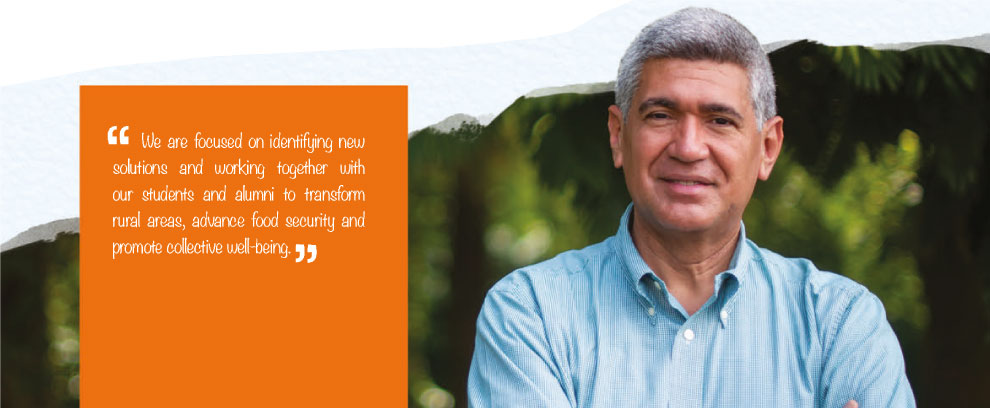
 |
 |
|
Prepare leaders with ethical values to contribute to sustainable development and to construct a prosperous and just society. |
Our actions are mission-driven to alleviate poverty, promote social justice and build a future where our communities achieve sustainable and shared prosperity. |
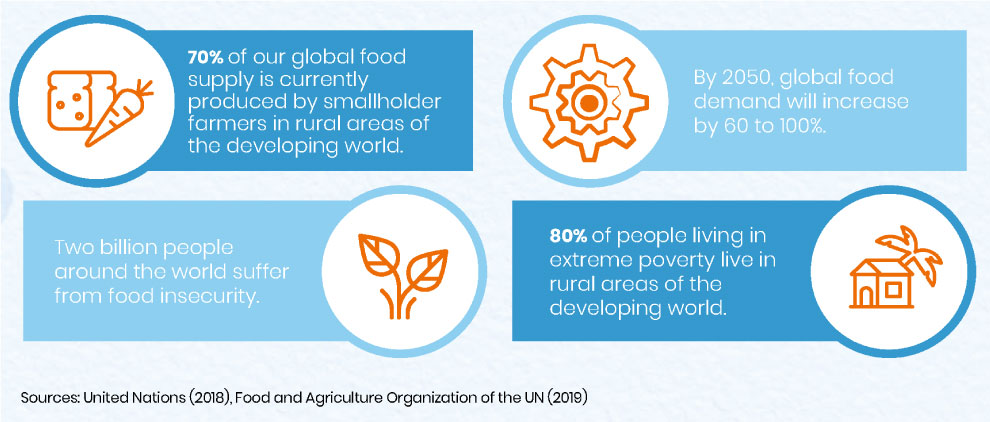
| Cover: Joseline Rosero (‘20, Ecuador) | “EARTH supports people’s ideas. It is one of its greatest features. The lab doors are always open for us to do research. We practice in the field and have many alternative learning spaces. This allows us to test the feasibility of our ideas and get good results.” |
Each year EARTH actively recruits more than 100 young leaders to join our highly experiential education program in Agricultural Sciences. During their four years at EARTH, students develop critical skills and attitudes to become effective leaders of positive change and prosperity through the core tenets of EARTH’s academic program:
| Hands-on learning | Community engagement | Entrepreneurial innovation |
| 75% of all academic learning occurs through hands-on training and problem-solving on issues relevant to the sustainability challenges of today and tomorrow. | Students complete more than 350 hours of community service and training and spend seven weeks living in rural communities near EARTH’s La Flor campus in Guanacaste. | All students receive a loan to start and operate a real business during their first two years at EARTH. |
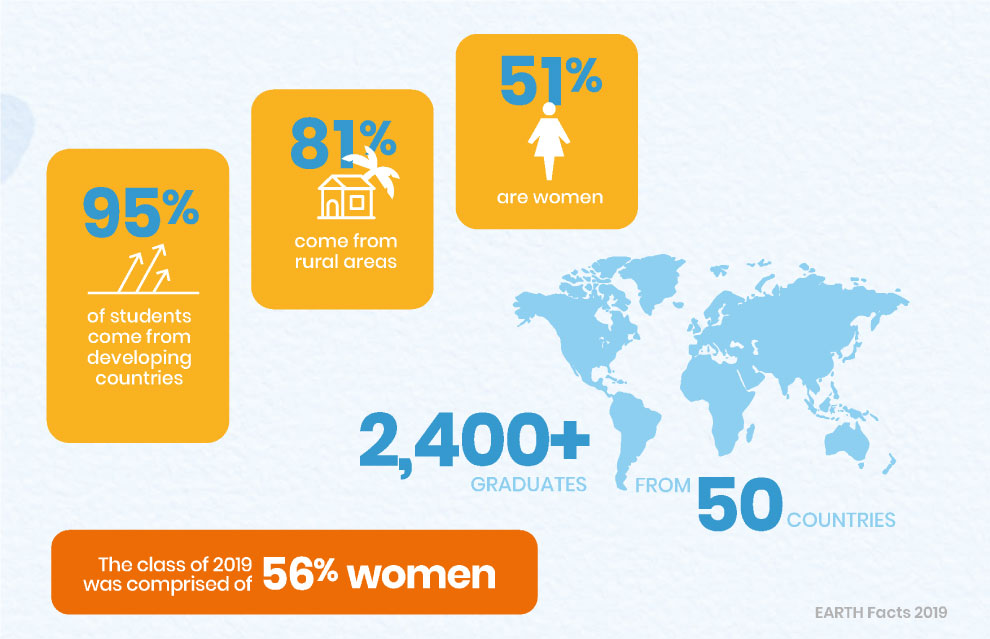
Our Academic Program
A glimpse into 2019
Since our founding, EARTH developed a unique and integrated academic model based on experiential learning. Using this model, we have trained and educated thousands of enlightened leaders for the world. In the field and in the classrooms, we work to ensure our students gain the knowledge, values, skills and attitudes they need to address global issues and create effective solutions. In 2019, we updated our graduate profile to include a focus on the use of science and technology to drive sustainable rural development.
Revising our graduate profile was a vital trigger to help us adapt our academic program to the skills and competencies that our world requires, especially during these challenging times. With this in mind, our main lines of action focus on promoting food security, sustainability and collective wellbeing.
Graduate Profile
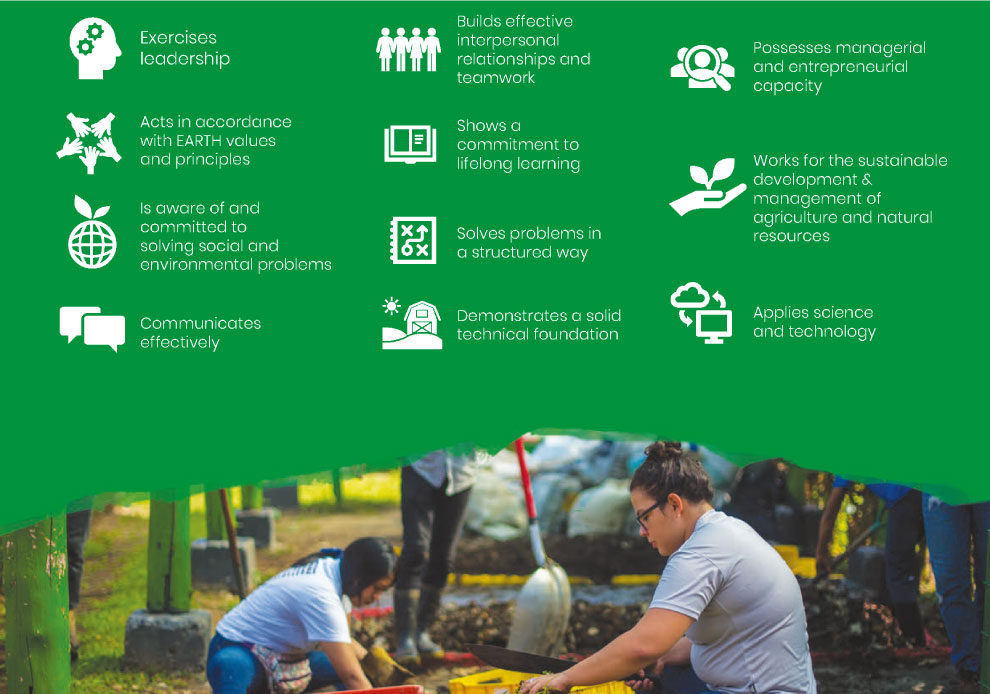
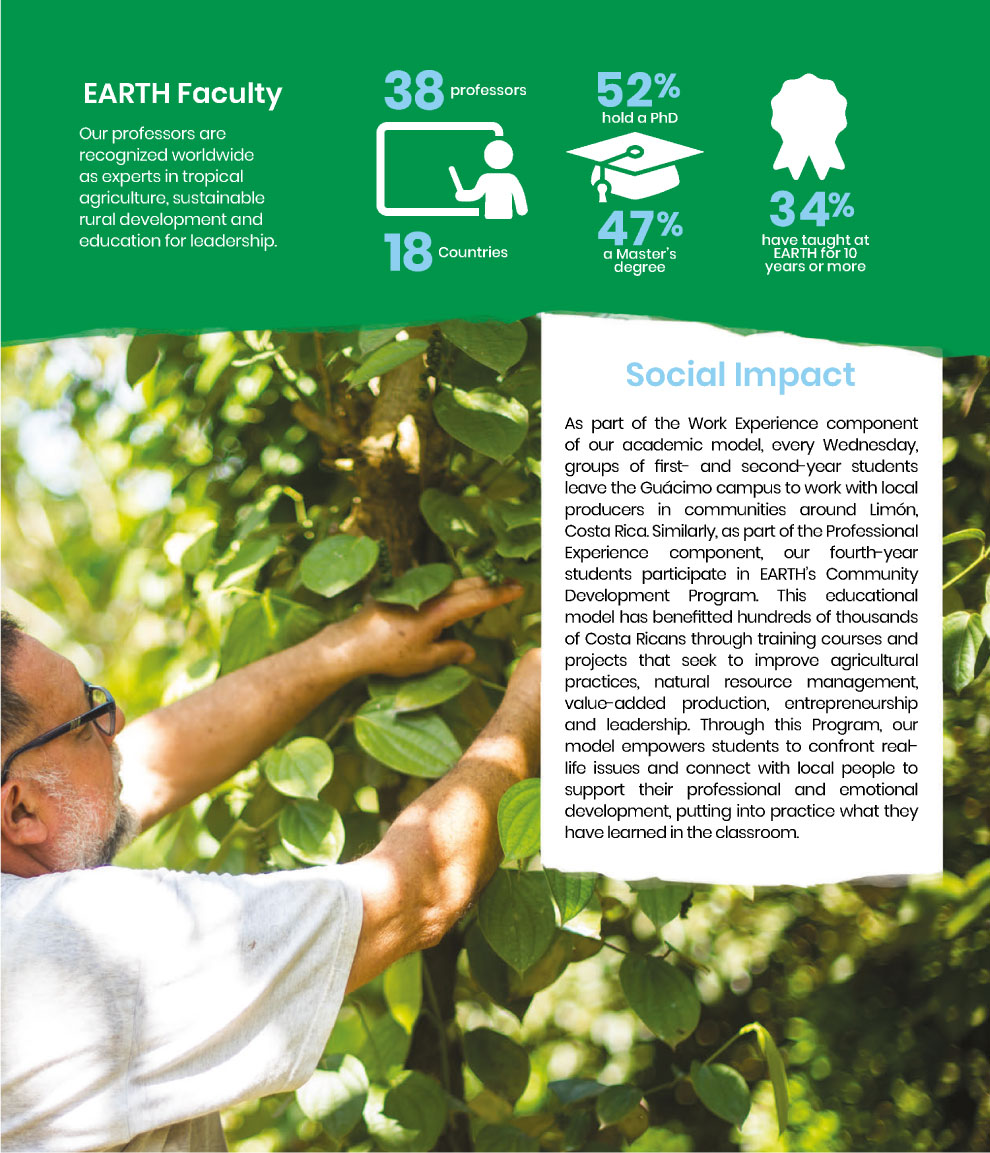
At Villa Las Orquídeas, Juanita Loaiza and Oswaldo Calvo produce spices, fruit and dairy products from goats. Our students have worked together with them to improve their pasture, apply sustainable pest control techniques, improve financial management and strengthen social ties. EARTH’s educational model helps build integrated and solid connections between and among students, producers and local leaders.
2,400+ graduates from 50 countries
In recent surveys, employers and community members recognize EARTH alumni for their strong leadership skills, solid technical knowledge, and their commitment to environmental sustainability, social justice and values.
82% of graduates are back in their home countries catalyzing positive change
During 2019, the Alumni Affairs Office focused on:
| Consolidating its operation as part of the President’s Office and establishing a work plan and strategy. | Strengthening collaboration with governance bodies like the President’s Alumni Advisory Board, which aims to provide strategic support to the President through the eyes and experiences of graduates and to put forward ideas and proposals that help to strengthen the University. |
| Strengthening communication, actions and joint work with alumni associations (AGEARTHs) in different countries around the world. | |
| Supporting greater participation of graduates in the Admissions process. | |
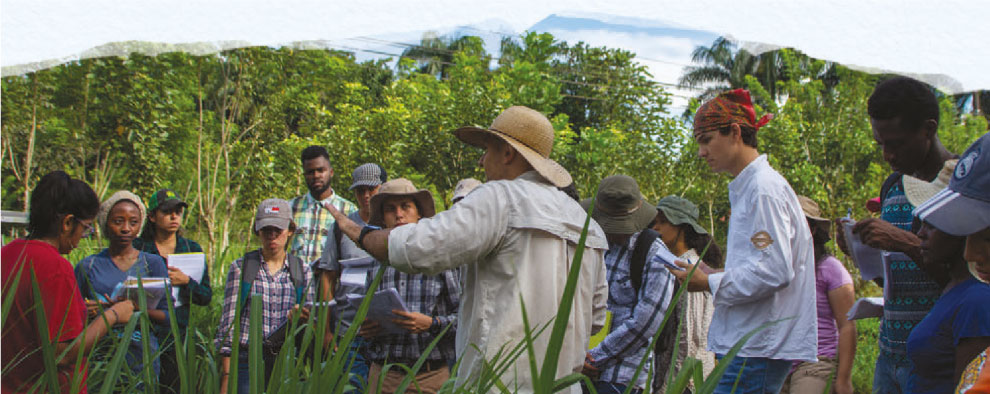
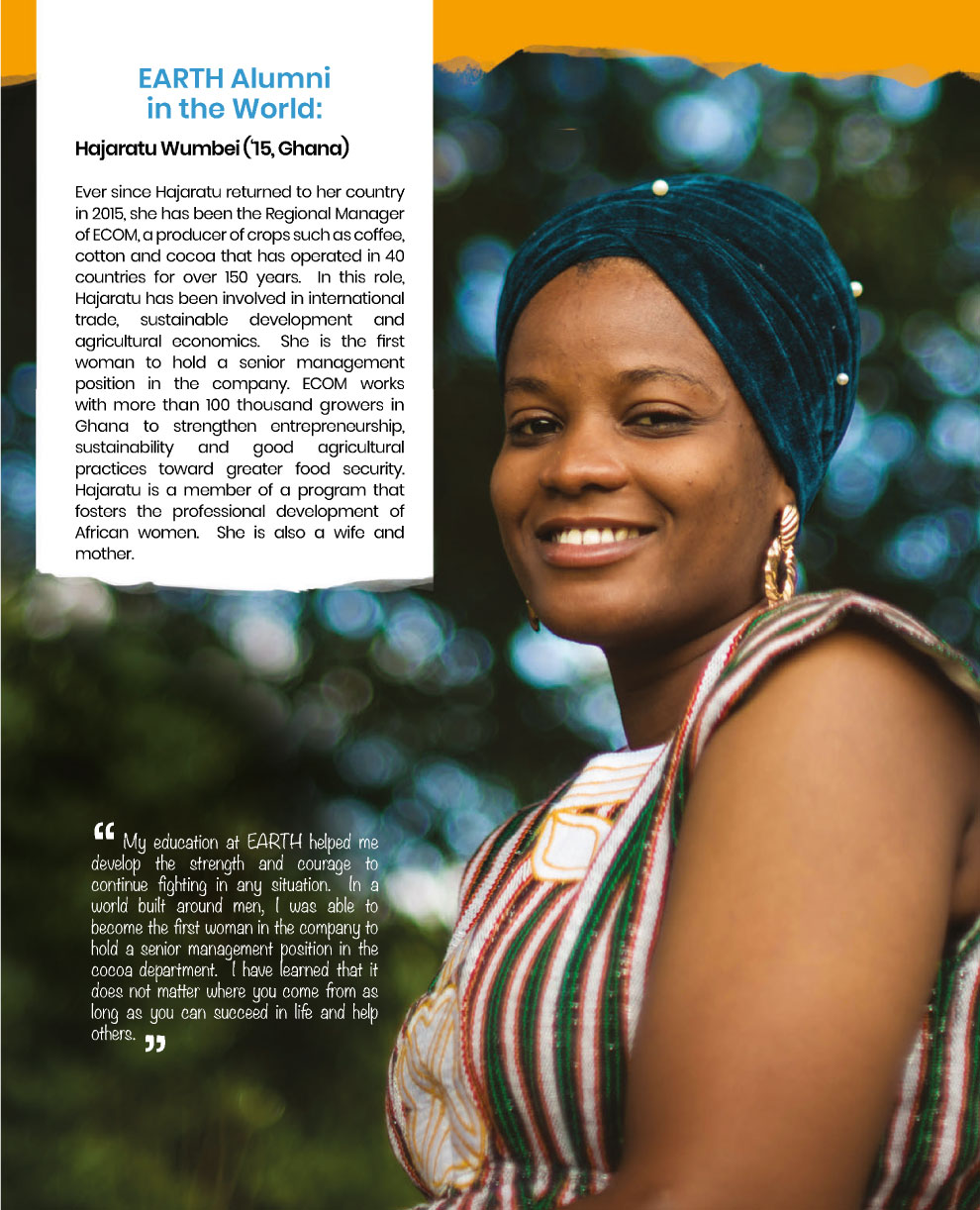
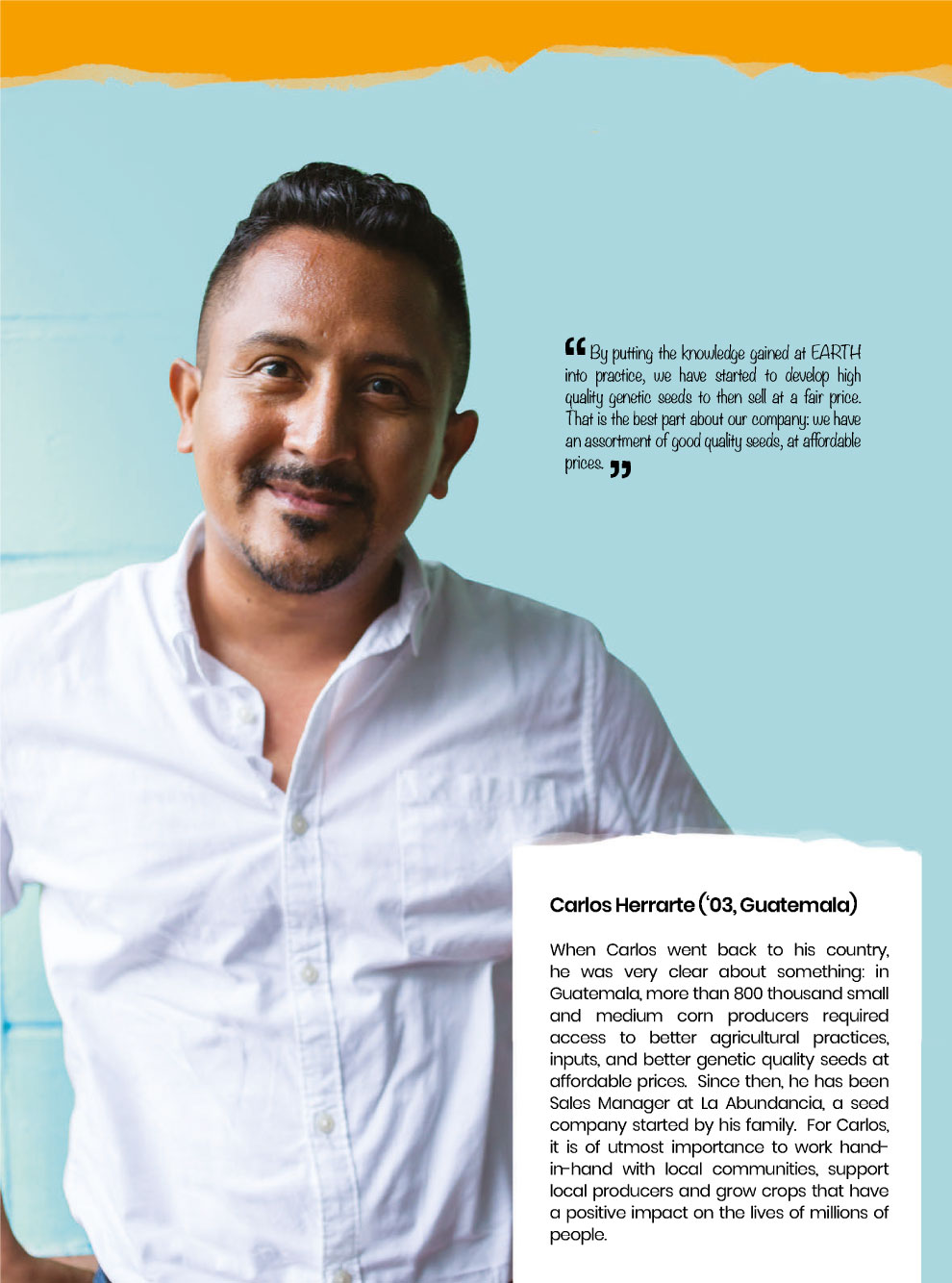
There is abundant evidence that our current food systems are failing us as humans and the planet we inhabit – new solutions are urgently needed. EARTH Futures is the University’s impact platform, which seeks to grow EARTH’s contribution toward a healthy, inclusive and sustainable future of food and to strengthen the role that rural producers and communities in developing regions will play in this effort. During 2019, EARTH Futures advanced with multiple efforts:
This program works toward the transformation of agricultural education in developing regions in order to promote a new generation of young leaders equipped to transform our global food systems in the face of population growth, climate change and endemic rural poverty. In 2019, we continued working with our longstanding partner RUFORUM, a network of more than 100 African universities, to strengthen their academic programs via greater focus on entrepreneurship and community development as core pillars to more sustainable food systems. Specifically, EARTH Futures expanded efforts with two additional universities in Uganda, Busitema University and Ugandan Christian University.
We are grateful for the engagement and support of our institutional partners and donors and to our local community partners, whose wisdom guides us in the solutions we seek to co-develop and whose resolve and leadership inspire us in all our work.
This program works to develop, test and scale new solutions to critical challenges in rural areas, where 70% of global food production is led by small farmers. One such challenge is that current food production systems are contributing to severe environmental degradation and biodiversity loss in rural areas and are threatening climate stability and ecosystem resilience globally. As an innovative response, EARTH Futures and our partners helped formalize the Rio Parismina Biological Corridor – comprised by over 80,000 acres with important rivers and biodiversity – and to promote alternatives for sustainable livelihoods alternatives and environmental awareness among local communities. Furthermore, in alliance with Fundación CRUSA, EARTH Futures developed an innovative training program and technical tools to strengthen climate adaptation and resilience practices among small farmers in climate-vulnerable regions. Finally, in alliance with Costa Rica’s Development Bank (SBD), our Precision Agriculture Center worked to consolidate a model using precision agriculture technologies to support small and medium farmers in sustainable farm management, through an informed and efficient use of land and water resources and agricultural inputs.

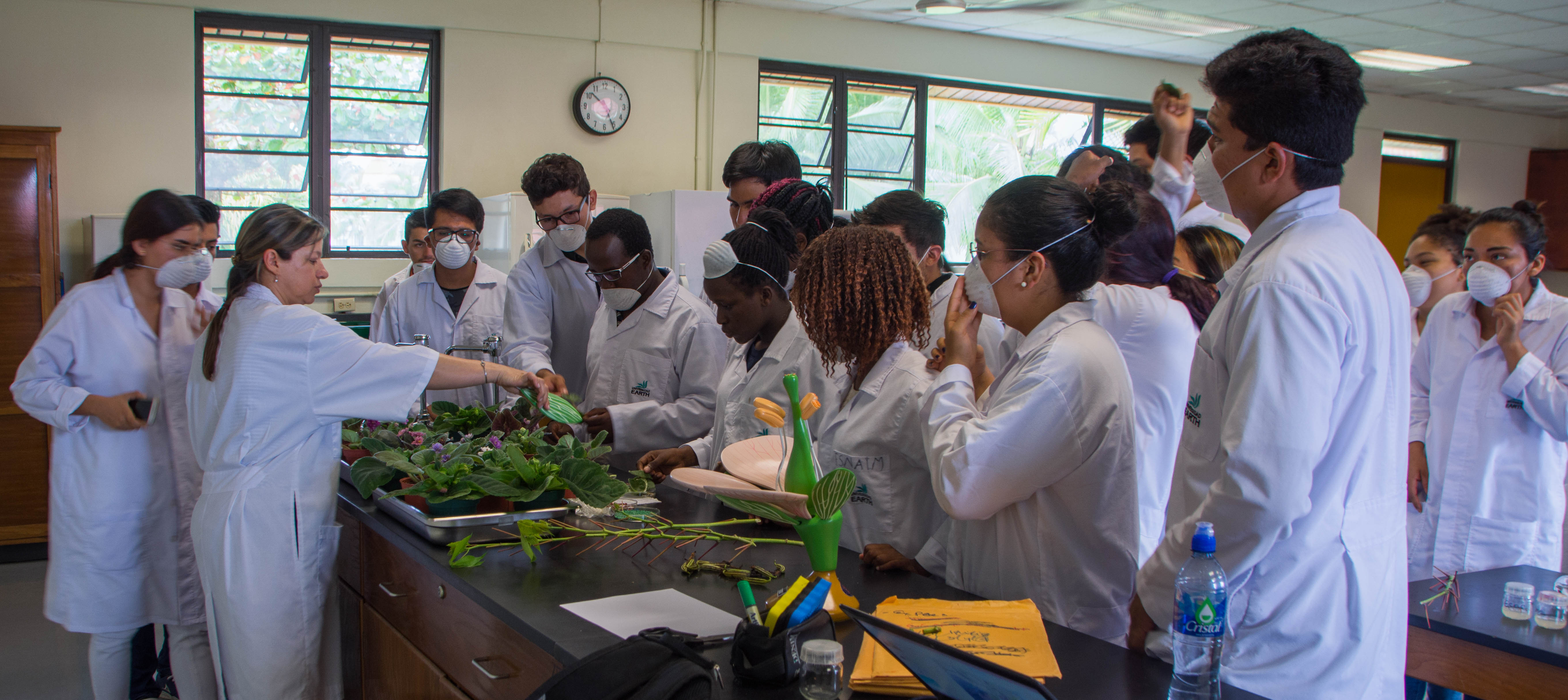
EARTH deeply appreciates our longstanding partnership with the Mastercard Foundation. 2019 was an important year, as we agreed to develop our collaboration with several exciting new components:
Mastercard Foundation will support a total of 125 new scholarships through the graduating class of 2028. Seventy-five percent of these scholarships will support African students, and 75% will support women. There will also be a rigorous effort to recruit students from refugee communities in both Latin America and Africa.
In addition, we are partnering on an exciting new Fellowship Program, developed to enhance and facilitate the transition of African students back to their home countries and communities as successful professionals and entrepreneurs. This competitive program will provide graduates with a modest stipend, mentoring and other services to support their transition following graduation. Through EARTH’s strong network of African partners, EARTH plans to offer graduates attractive opportunities along four possible tracks:
Finally, a third new component of the partnership includes the development of a series of online resources, focused on entrepreneurship, to support graduate entrepreneurs from EARTH as well as Mastercard Foundation partner institutions.
These new components align with EARTH’s strategic plan to grow the University’s overall impact by providing increased resources and support to our graduates in their role as change agents for a better world.
Careful stewardship of resources, together with growth in charitable gifts and commercial activities, are contributing to a healthy financial picture that enables us to fulfill our mission.
| Fund Sources | 2019 | ||||
|---|---|---|---|---|---|
| Tuition payments and donations | $9,842 | ||||
| Other income (Commercial Activities and other) | $2,073 | ||||
| EARTH Endowment | $9,668 | ||||
| Total: | $21,584 |
| Expenses | 2019 | ||||
|---|---|---|---|---|---|
| Compensation and benefits for personnel | $14,143 | ||||
| Operational expenses | $6,964 | ||||
| Equipment investment and replacement | $459 | ||||
| Contingencies | $18 | ||||
| Total: | $21,584 |
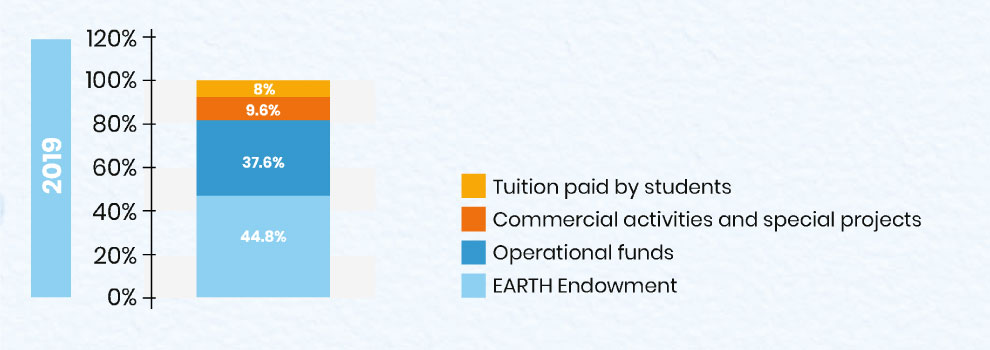
From its headquarters in Atlanta, Georgia, the EARTH University Foundation – a registered 501 (c)(3) public charity – provides vital funding for EARTH’s educational mission, programs and projects thanks to generous gifts from a global community of supporters.
| Assets | 2019 | ||||
|---|---|---|---|---|---|
| Cash and cash equivalents | $2,076,165 | ||||
| Pledge receivable, net | $4,345,743 | ||||
| Endowment and other investments | $75,311,018 | ||||
| Other assets | $636,876 | ||||
| Total assets | $82,369,802 |
| Liabilities and net assets | 2019 | ||||
|---|---|---|---|---|---|
| Liabilities | $380,940 | ||||
| Net assets | $81,988,862 | ||||
| Total liabilities and net assets | $82,369,802 |
| 2019 | ||||||||||||||||||||||||
|---|---|---|---|---|---|---|---|---|---|---|---|---|---|---|---|---|---|---|---|---|---|---|---|---|
| Programs | Fundraising | Administrative | Total Expenses | |||||||||||||||||||||
| Scholarships | $4,871,839 | – | – | $4,871,839 | ||||||||||||||||||||
| Project and Program Expense | $1,018,821 | – | – | $1,018,821 | ||||||||||||||||||||
| Foundation Operations | $294,244 | $704,800 | $532,408 | $1,531,452 | ||||||||||||||||||||
| Total | $6,184,904 | $704,800 | $532,408 | $7,422,112 |
We recognize and appreciate the generous support of the following donors whose gifts were received in 2019, with special thanks to those whose lifetime giving exceeds US$1 million. These individuals, businesses, foundations, governments and international organizations make our mission possible.
We thank the following corporations and institutions around the world who hosted our third-year students as interns in 2019. The Internship helps our students build critical leadership skills and networks, while deepening their knowledge and giving them the opportunity to apply the skills developed at EARTH in a professional setting. Tim Solso Yanine Chan, Dean and Vice President of Academic Affairs Emily Fintel Kaiser, Acting Executive Director of EARTH Futures and Strategic Advisor to the President Meridith Rentz, Vice President of Global Development & Executive Director of the EARTH University Foundation Paula Robert, Executive Director of the EARTH Trust Patricia Loría, Vice President of Finance Ramón González, Vice President of Operations Alexa Glo, Director for the President’s Office and Board Relations *At the end of 2019
Our Internship Hosts
Agrícola El Cántaro
Agro Monteroga
Agropecuaria Las Pilas SA
AGRORUM SA
Alia2 S.A.
Alimentos Congelados S.A.
Associação dos Bananicultores de Corupá (Asbanco)
British Tobacco Company (BAT)
CACEP
Café Perú París SA de CV
CAFECOL A.C.
Centro Agronómico Tropical de Investigación y Enseñanza (CATIE)
Citrofrut Agrícola (Grupo Citrofrut S.A. de C.V.)
Consultorías Especializadas G&G, S.A.
COOPECEDRAL R.L.
Corporación PRO S.A.
Costa Nursery Farms
Cruz Roja Ecuatoriana
Delaware State University
Desarrollo Rural y Medio Ambiente A.C.
ECOSUR, El Colegio de la Frontera Sur Unidad Campeche
ESPOL (Escuela Superior Politécnica del Litoral)
GBT Global Ltda
Federación Comercializadora de Café Especial en Guatemala (FECCEG)
Fertileva
Finca Madre Tierra
Finca Orgánica Klelia Irlanda
PermaTree SuperFoods S.A.
Freedom in Creation
Frutilla San Pedro Melipilla
Frutas Selectas S.A, Frutsesa
Fundación La Iguana
Fundación Pedro y Elena Hernández A.C.
Ganadera Riggioni Romero
GAOS
Glatfelter
Granja Orgánica El Motilón
Grasslands Research Station
Cooperativa Madrileña
Grupo Xcaret
Hacienda Tempisque S.A.
Cooperativa de Usuários do Freixo do Meio, Crl
Instituto Hondureño del Café (IHCAFE)
Industrias Lacteas Toni S.A.
Instituto de Investigaciones Forestales, Agrícolas y Pecuarias (México)
Instituto de Investigación y Tecnología Agroalimentaria (IRTA)
Instituto Tecnológico Superior de Hopelchen (ITSH)
Kaiima Bio-agritech Ltd.
Kalimajari Foundation
Kalsec, Inc.
Kendall Farms
Kibbutz YAGUR
La Hammonia y Cía, Ltda
Unión de Productores Maya Vinic
Moonstone Farm
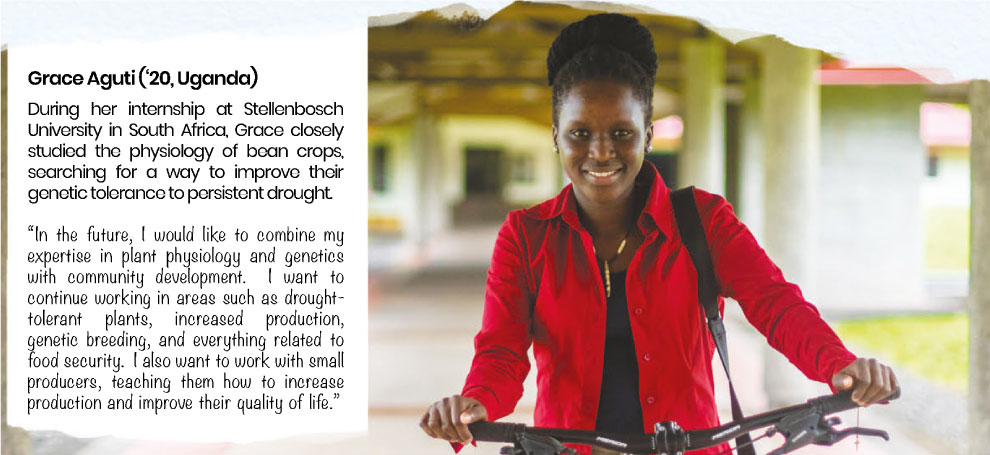
Our Boards and Senior Leadership*
EARTH University Board of Directors
Alan Kelso, Vice Chairman
Pedro León, Secretary
Ana Regina Aguirre de Riojas
Anne Slaughter Andrew
Bobby Moser
Dele Olojede
Franklin Chang-Díaz
Francis Durman
Marisa Brenninkmeyer
Mark Brouse
Emeriti
Isabel Abreu
† Eduardo King Carr
† Glen Taggart
† Hernán Fonseca
† José Elías Sánchez
† Jorge Manuel Dengo O.
† Luis Alberto Monge
† Norman A. Brown
† Rodolfo Cortés R.
† Salvador Alemany EARTH University Foundation Board of Trustees
Mark McGahan, Treasurer
Erika González-Akre, Secretary
Adrienne Meisel
Claire “Yum” Arnold
Christopher Carter
Gustavo Manrique
Gustavo Puente
Ian Davidson
Jane C. Black
Lynn Hoffman-Brouse
Mark Ohrstrom
Michael Besançon
Ross Arnold
Tracy Hoover
Emeriti
Samuel Kaymen
Charlotte S. Metcalf EARTH University Board of Trustees
Anne Slaughter Andrew
Francis Durman
Mark Brouse
Executive Team